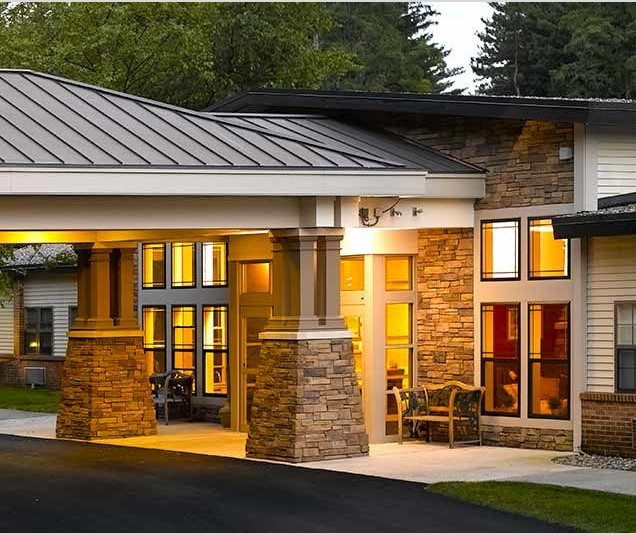Senior living is a wonderful way to support your loved one. These communities offer an environment tailored to your loved one’s needs and give them a place they can call home.
With a wide range of services, programs, amenities, and more, these communities are an excellent choice. But when choosing a senior living community, it’s important to choose the right type of care for your loved one—like assisted living or memory care.
Assisted living is a residential community for older adults who want to prioritize independence but get support with certain daily activities. On the other hand, memory care caters to older adults living with dementia and other forms of cognitive decline to provide them with a safe, structured, and supportive home.
Explore the ins and outs of each community ahead, along with determining factors for potential residents.
What Is Assisted Living?
Imagine a supportive community where your loved one can maintain their independence while getting support for the daily tasks causing them trouble. That’s assisted living.
Whether your loved one needs a hand with bathing, managing medication, dressing themselves, or housekeeping, assisted living can help. These communities offer a warm, home-like environment and a team of experienced caregivers to help prioritize your loved one’s quality of life.
Assisted living bridges the gap between independent living and full-time care. It’s a supportive living environment for older adults who need a hand with things here and there but don’t need the higher level of medical care offered by other senior living options.
Unlike a one-size-fits-all approach, these communities work closely with residents and their families to create a personalized care plan. This plan considers your loved one’s unique needs, preferences, and abilities.
Whether it’s help with housekeeping, transportation to doctor appointments, or participating in social activities, the staff tailors their services to empower your loved one to thrive.
Who Qualifies for Assisted Living?
Assisted living is a wonderful option for seniors looking for a supportive environment that promotes independence and autonomy.
A person thinking about moving to assisted living should be cognitively and medically stable. While these communities can help in some emergencies, they aren’t often designed to offer long-term advanced medical care. A potential resident should also be over the age of 55.
Instead, assisted living aims to help with daily difficulties like laundry, cooking, and cleaning—that’s where these communities shine.
When thinking about assisted living for a loved one, keep an eye out for the following signs:
- Struggles with daily tasks: If everyday activities have become a challenge like preparing meals, keeping house, or managing medications, assisted living can provide the support needed to maintain a sense of normalcy.
- Decreased mobility: Perhaps your loved one experiences difficulty getting around safely. Assisted living communities offer assistance with mobility and often have accessible features to promote independence within the residence.
- Social isolation: Social interaction is vital for well-being. Assisted living communities provide opportunities to connect with peers through social events and activities, combating feelings of loneliness and isolation.
- Safety concerns: If you worry about your loved one living alone, particularly if they’re prone to falls or have cognitive decline, assisted living offers a secure environment with staff available 24/7 to ensure their well-being.
If these signs sound familiar, your loved one likely qualifies for assisted living. It’s important to note that every community is different, and some may have certain criteria potential residents need to meet before moving in.
What Is Memory Care?
While assisted living aims to help with daily difficulties, memory care takes a different approach. Memory care communities are a special type of senior care designed for older adults living with Alzheimer’s disease and other types of dementia.
These communities are designed to meet the specific needs of individuals with memory-related issues by offering:
- A safe, secure, and structured environment
- Specialized staff trained in dementia care
- Therapeutic programs tailored to enhance cognitive function
- Activities that promote social engagement and comfort
- Memory-enhancing therapies, including music and art therapy
- Support groups and resources for families and caregivers
In memory care, every aspect is tailored to support your loved one. The teams in these communities undergo additional training to better support older adults with dementia, and the physical environment itself is designed to be easy to navigate. Memory care offers a structured and safe place your loved one can call home while receiving the care they need.
When to Move to Memory Care
Deciding when to move a loved one to memory care can seem complex at first, but it doesn’t have to be. These communities are designed for older adults living with dementia and other types of memory impairment or cognitive decline.
If you notice any of the following signs in your loved one, it may be time to consider memory care:
- Forgetting to take medication or taking it incorrectly
- Becoming disoriented in familiar places
- Showing changes in behavior, like becoming easily agitated or aggressive
- Starting to neglect personal hygiene or household chores
- Experiencing increased confusion with time, people, or places
- Exhibiting safety concerns, like leaving the stove on or disorientation
- Isolating or withdrawing from social activities
- Suddenly losing weight or forgetting to eat
These are all indicators that your loved one could benefit from a move to memory care.

Quality Care in Guilderland
If you can’t decide what form of senior living would be more helpful for your loved one, contact our team at Peregrine Senior Living at Guilderland. Whether your loved one needs assisted living or memory care, we can help. Schedule a visit with us today, and let’s work together to find your loved one a community that truly feels like a home.













Monday morning meditation! Thank you so much Sheryl for guiding us through a 30 minute meditation this morning. It was a first for many and we all enjoyed it and felt so relaxed after! 😊 ... See MoreSee Less
1 CommentsComment on Facebook
Happy Valentine’s Day! ❤️
Love takes many forms—between partners, friends, families, and even across generations.
Today we celebrate the love that fills our community: the care shared between residents and team members, the laughter that brightens our halls, and the sense of belonging that reminds us we’re never alone.
May your day be filled with connection, warmth, and heart.
peregrineguilderland.com/ ... See MoreSee Less
0 CommentsComment on Facebook
Early Valentine’s Day celebration with our lovely ladies!! ♥️ ... See MoreSee Less
2 CommentsComment on Facebook
Can’t believe the crowd we had today for Andrea’s Nia moving to heal exercise class! Thank you so much for accommodating the residents that keep walking into the room wanting to join! Was so much fun with a full room!😊 ... See MoreSee Less
0 CommentsComment on Facebook
Spent the morning up the road at Farnsworth middle school for an outing! This is our 3rd year coming here for a valentines craft that Lisa Watson facilitates her students to do with us and it was so sweet! The students were all so great with our residents and our residents had the best time with them! They also had the room next door play their instruments for us which was great as well! Thank you so much to the amazing students and teachers there that made our residents feel so special this morning! They’ve been talking about it all day and we look forward to it every year! 💕😊 ... See MoreSee Less
2 CommentsComment on Facebook
February is American Heart Month, a time to focus on caring for the muscle that keeps us moving and thriving. 🫀
We encourage residents to take heart-healthy steps every day: enjoying balanced meals, staying active, connecting socially, and taking moments to rest and recharge.
Together, we can make heart health a daily celebration of life and well-being.
peregrineguilderland.com/ ... See MoreSee Less
Learn More
Assisted Living & Memory Care in Guilderland, NY | Peregrine
peregrineguilderland.com
Discover assisted living and memory care at Peregrine Guilderland—personalized senior support in a warm, compassionate community setting in Guilderland, NY.0 CommentsComment on Facebook
Navigating your next chapter with Peregrine Senior LivingFeb 12, 4:00pm300 Mill Rose Court, Slingerlands, NY, United States, New York 12159We are proud to partner with Marisa Multari- Licensed Real Estate Salesperson for our upcoming discussion on downsizing✅
This will be a unique opportunity to talk with Marisa directly & the entire Peregrine Senior Living community relations team. Come get all of your questions answered on the current housing market & your senior living options! 🧠🏠
Please send us a message to [email protected] if you'd like to attend & we hope to see you there!
Peregrine Senior Living at Crossgate
Peregrine Senior Living at Shaker
Peregrine Senior Living at Colonie
Peregrine Senior Living at Clifton Park
Peregrine Senior Living At Delmar Place ... See MoreSee Less
0 CommentsComment on Facebook